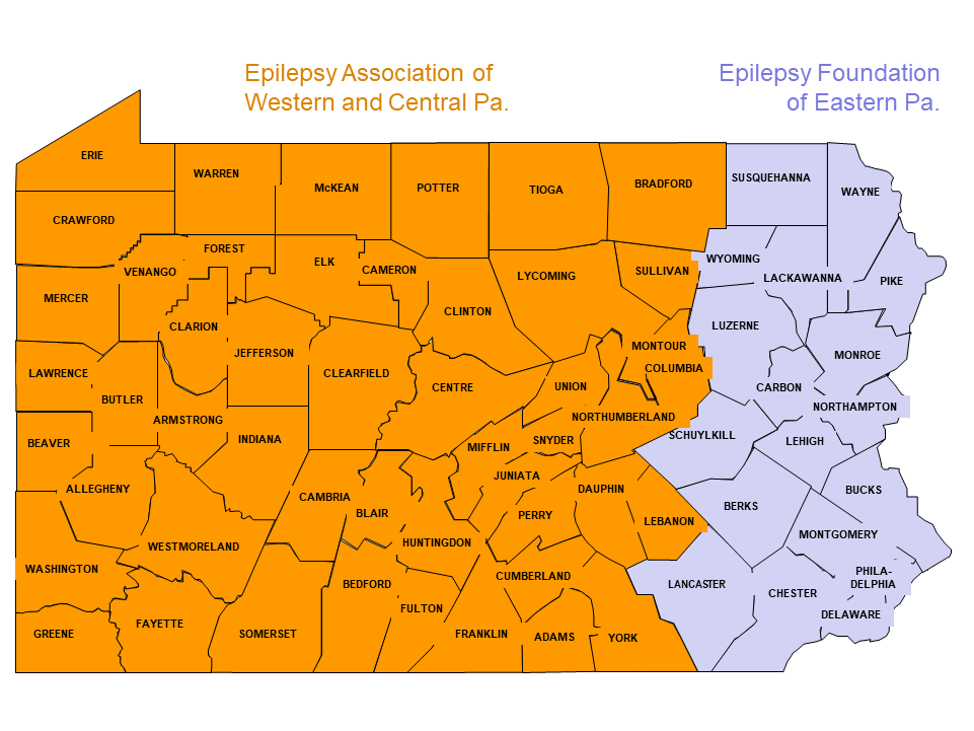Epilepsy Program
The Bureau of Family Health's Epilepsy Program promotes awareness and understanding of epilepsy through educational events to schools and communities and via toll-free numbers to provide information and referral services to children, youth, and young adults diagnosed with epilepsy.
What is epilepsy?
Epilepsy, from the Greek word meaning "to seize", is a brain disorder that affects more than 2.5 million Americans; 181,000 people are newly diagnosed each year. Epilepsy affects one to two percent of Pennsylvanians. More people suffer from epilepsy than from Parkinson's disease, cerebral palsy, multiple sclerosis, and muscular dystrophy combined. Epilepsy is the third most common brain disorder after stroke and Alzheimer's disease. About 70 percent of the time, the cause of epilepsy is not known. Head injury, infections, or heredity can be involved.
Epilepsy is not a disease, a form of mental illness, or a sign of low intelligence. It is not contagious. It can affect anyone, at any age, at any time. Most people with epilepsy lead normal and happy lives. They attend school, get jobs, get married, and have children.
What are seizures?
Seizures are the result of sudden, brief changes in the brain's electrical balance. When there are too many electrical charges in the brain, seizures occur. Seizures can affect awareness, physical movements, or speech. They typically last a few seconds to a few minutes.
Seizure features vary from person to person. Some seizures are accompanied by tremors and loss of awareness. During other seizures people appear to be daydreaming or "switching off." The most common seizures look like blank stares that lasts a few seconds, rapid eye blinking, chewing movements, and other random movements. Some seizures look like heart attacks, strokes, or lack of balance.
Often seizures first develop during the pre-school and elementary school years. While epilepsy is usually a lifelong condition, many people with epilepsy reduce the number of seizures they experience through the use of medications, special diets, or surgery.
When do seizures happen?
Seizures can happen anywhere, anytime. Most seizures occur without warning, although some people have funny feelings or weird smells right before a seizure. People find that certain things sometimes trigger their seizures, such as stress, anxiety, or too little sleep.
What do I do if I witness someone having a seizure?
Since people may fall and begin to shake while having seizures...
- Stay calm and keep track of the time
- Move anything out of the way that might injure the person
- Gently roll the person onto his or her side
- Put something soft under his or her head - not your hand
- Loosen anything tight around his or her neck
- Do NOT put anything into the person's mouth
- Do NOT try to hold the person down or stop them from shaking
- Check for epilepsy identification
If the seizure lasts longer than
five minutes, get help! Remember, if you see someone having a seizure, you can help. You can't do anything to stop the seizure, but you may be able to prevent and/or minimize injury that might occur as a result of the seizure.
If you have epilepsy, you are not alone
Epilepsy might be something you have, but it is not who you are. There are many things you and your loved ones can do to cope with the condition.
Seek information and assistance
The Epilepsy Program can be of assistance in learning more about epilepsy and related services. Funding for the Epilepsy Foundation of Eastern Pennsylvania makes the Epilepsy Program services available in eastern counties of Pennsylvania and funding for the Epilepsy Association of Western and Central Pennsylvania makes the services available in the remainder of the state.

In central and western Pennsylvania call the
Epilepsy Association of Western and CentralPennsylvania at (800) 361-5885. Their mission is to improve the quality of life for persons with epilepsy and to dispel the myths, stigma, and misunderstandings associated with epilepsy.
In eastern Pennsylvania call the
Epilepsy Foundation of Eastern Pennsylvania at (215) 629-5003. Their mission is to stop seizures, find a cure, and overcome the challenges created by epilepsy through efforts including education, advocacy, and research to accelerate ideas into therapies.
You may also contact the
Epilepsy Foundation of America® at (800) 332-1000.
Communicate with your doctor
Keeping good notes and records about your seizure activity will give your doctor a better understanding about how epilepsy affects you and what treatments might be most effective. Your family and friends may be able to provide you with a good description of what your seizures are like, how long they last, and what recovery from seizure activity is like for you. This type of information, along with a summary of how you are reacting to medications, is valuable information for your doctor.
Educate others
Request epilepsy education and first aid training for the people closest to you - your family members, friends, teachers, and co-workers. Contact the Epilepsy Program to learn what is available in your area. See the section called "Seek information and assistance" above.
Additional Resources
Contact Information
Bureau of Family Health
Division of Community Systems Development & Outreach
Epilepsy Program
Health and Welfare Building
625 Forster St.
7th Floor East
Harrisburg, Pennsylvania 17120-0701
(717) 772-2763 or (877) PA-HEALTH